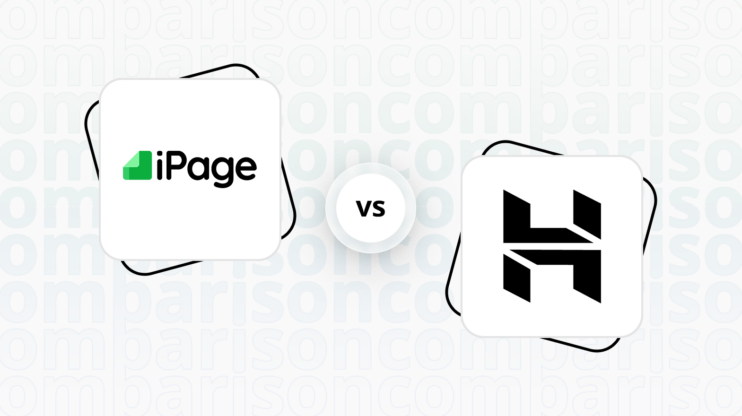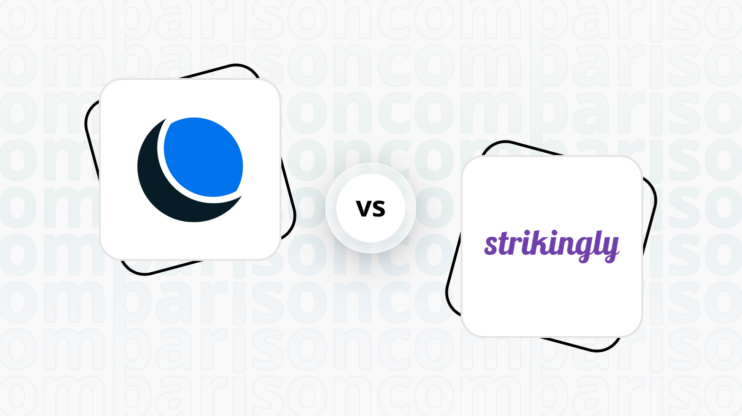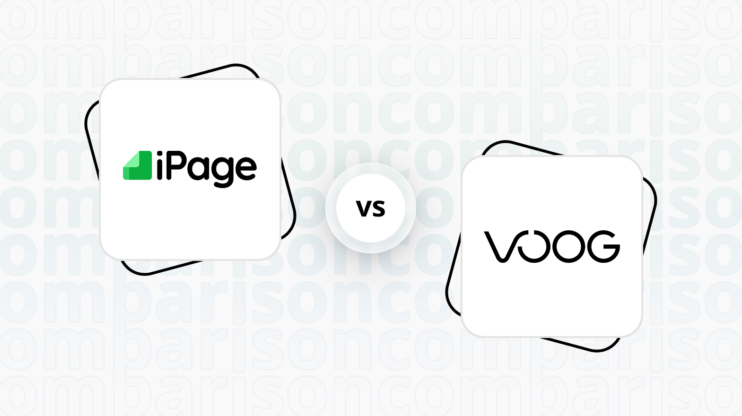Duda vs SubHub: Final verdict
Duda and SubHub cater to different needs, with Duda excelling in general website building and SubHub focusing on membership sites.
-
Duda (Overall Grade: 7.8/10)
is a versatile website builder that offers a wide range of customizable templates, robust ecommerce features, and comprehensive SEO tools. It is ideal for users looking to create professional, responsive websites without coding knowledge. Duda’s strong customer support, extensive learning resources, and advanced hosting solutions make it a reliable choice for agencies and designers managing multiple client websites. -
SubHub (Overall Grade: 5.6/10)
is tailored for content creators and entrepreneurs aiming to build and monetize membership sites. It simplifies the process of setting up subscription models and managing member access, making it an excellent choice for those focused on community building. While SubHub offers user-friendly tools and good customer support, it lacks the extensive customization and advanced features found in Duda, making it less suitable for users with broader website needs.

|

|
|
|---|---|---|
|
Design functionalities & templates |
8.3 |
6.8 |
|
Ease of use |
8.4 |
7.7 |
|
Ecommerce |
7.4 |
5.9 |
|
Website Editors |
8.3 |
6.9 |
|
Product testing options |
8.4 |
7.0 |
|
Price |
7.9 |
6.8 |
|
Hosting quality |
8.8 |
5.5 |
|
Website speed optimization |
7.6 |
5.6 |
|
Plugins/extensions and integrations |
7.7 |
5.7 |
|
Marketing features |
7.1 |
5.7 |
|
Customer support |
7.5 |
6.3 |
|
Security |
8.6 |
4.0 |
|
AI capabilities |
7.3 |
0 |
|
User Management |
8.0 |
5.2 |
Which one is the best for ecommerce: Duda or SubHub?
 7.4
7.4
 5.9
5.9
Verdict
: Duda is more suitable for comprehensive ecommerce needs, while SubHub is better for membership sites with basic ecommerce functionalities.
-
Duda
: Duda offers a robust set of ecommerce features, including product and inventory management, payment processing, and SEO tools. It supports a variety of ecommerce functionalities, making it a strong choice for businesses looking to create and manage online stores. With a score of 7.4, Duda excels in providing a professional and responsive ecommerce experience. -
SubHub
: SubHub is designed primarily for membership sites but includes basic ecommerce features such as PayPal and Stripe integration, and support for physical and digital product listings. However, it lacks the depth and variety of ecommerce tools that Duda offers, reflected in its lower score of 5.9. SubHub is ideal for content creators and entrepreneurs focusing on community building and content monetization.
Which one is the best for informational and business websites?
 8.4
8.4
 7.2
7.2
Verdict
: When it comes to creating informational and business websites, Duda outshines SubHub with its higher score of 8.4 compared to SubHub’s 7.2. Duda’s extensive range of customizable templates, user-friendly interface, and robust hosting solutions make it a superior choice for businesses looking to establish a professional online presence.
-
Duda
: Duda is a versatile website builder that excels in creating professional and responsive websites without requiring coding knowledge. It offers a wide variety of customizable templates and features, making it ideal for businesses of all types. Duda’s platform is designed to be user-friendly, with a drag-and-drop interface and integrated SEO tools. Additionally, Duda provides a white label option for agencies and designers, allowing them to manage multiple client websites efficiently. With a score of 8.4, Duda is well-suited for informational and business websites. -
SubHub
: SubHub, scoring 7.2, is tailored for creating and managing membership sites. It offers tools specifically designed for content creators and entrepreneurs who want to build a community and monetize their content. While SubHub simplifies the process of setting up subscription models and managing member access, it may not be as versatile as Duda for general informational and business websites. SubHub’s focus on membership sites makes it a niche choice, but it lacks the broader design and customization options that Duda provides.
Duda vs SubHub: Detailed comparison
Design functionalities & templates
Design FunctionalitiesRepresents how well each platform allows for creative design and customization of websites.Score Components:
- Template Variety (30%): Range and quality of design templates.
- Customization (30%): Flexibility and options for design alterations.
- User Interface (20%): Ease and intuitiveness of the design process.
- Responsiveness (10%): Adaptability to different devices and screen sizes.
- Innovation (10%): Unique design features and tools.
 8.3
8.3
 6.8
6.8
🏆
Winner: Duda.
Duda offers a wider variety of templates and designs, more customization flexibility, and more creative design possibilities compared to SubHub.
Duda offers a wide variety of templates and designs for its website builder. With over 180 templates to choose from, users have the flexibility to create a website that suits their unique needs and style. The templates are professionally designed and cover various industries, ensuring that businesses of all types can find a suitable option. Additionally, Duda allows users to customize the templates further, giving them the freedom to personalize their website’s design and layout.


On the other hand, SubHub website builder offers a variety of customizable membership website templates designed to cater to different needs and themes. There are 14 specifically themed templates available, each designed to help users jump-start the design of their membership website homepages. These templates are fully customizable, allowing users to modify layouts, add or remove sections, and tailor content to fit their brand, ensuring flexibility in the design process.
Get a head start on website creation with AI
Create a custom website tailored to your business needs 10X faster with 10Web AI Website Builder!
Ease of use
Ease of useReflects the platform’s overall user-friendliness.Score
Components:
- Learning curve (40%): Quickness and ease of getting started.
- Interface design (30%): Simplicity and intuitiveness of layout.
- User guidance (20%): Quality of tutorials and support.
- Flexibility (10%): Adaptability to various user skills.
 8.4
8.4
 7.7
7.7
🏆 Winner: Duda
. With a score of 8.4, Duda is praised for its intuitive user interface and a wide range of customizable templates, making it accessible for users of varying technical skill levels. SubHub, scoring 7.7, offers a user-friendly platform designed for building membership websites and online courses, with a focus on ease of use and customer support. However, Duda’s extensive resources and support, including tutorials and customer service, ensure a smoother website building experience.
Learning Resources
🏆 Winner: Duda
. Duda’s learning resources are comprehensive and high-quality, catering to both beginners and advanced users with a wide range of documentation, video tutorials, and an active community forum. SubHub also offers a range of learning resources, including video guides and tutorials, but lacks a large community of users for additional support.
For ecommerce
EcommerceMeasures the platform’s effectiveness in supporting online business activities.Score Components:
- Ecommerce themes and templates (20%): Variety and design of templates.
- Product management (25%): Ease of managing and organizing products.
- Payment options (25%): Variety and convenience of payment methods.
- Ecommerce features (20%): Features for managing an ecommerce store.
- Integration (10%): Compatibility with external e-commerce tools and services.
 7.4
7.4
 5.9
5.9
When it comes to ecommerce, Duda offers a more comprehensive set of features compared to SubHub. Duda’s platform allows users to create and manage online stores as part of their website. These ecommerce features include the ability to sell physical and digital products, set up various payment methods, manage inventory, and process orders. Users can customize their online store, adjust shipping and tax settings, and use Duda’s tools for promotions and discounts.

|

|
|
|---|---|---|
|
Ecommerce themes and templates |
6.5 |
3.0 |
|
Product page customization |
7.5 |
6.5 |
|
Payment processing and commissions |
7.0 |
7.0 |
|
POS capabilities |
5.5 |
0.0 |
|
Payment gateways |
7.5 |
6.0 |
|
Product numbers |
7.0 |
5.0 |
|
Additional ecommerce features |
7.0 |
4.5 |
Duda ecommerce features:
- Product and Inventory management
- Payment processing
- Shopping and Tax settings
- Coupons and discounts
- SEO and Marketing tools
- Analytics and reporting
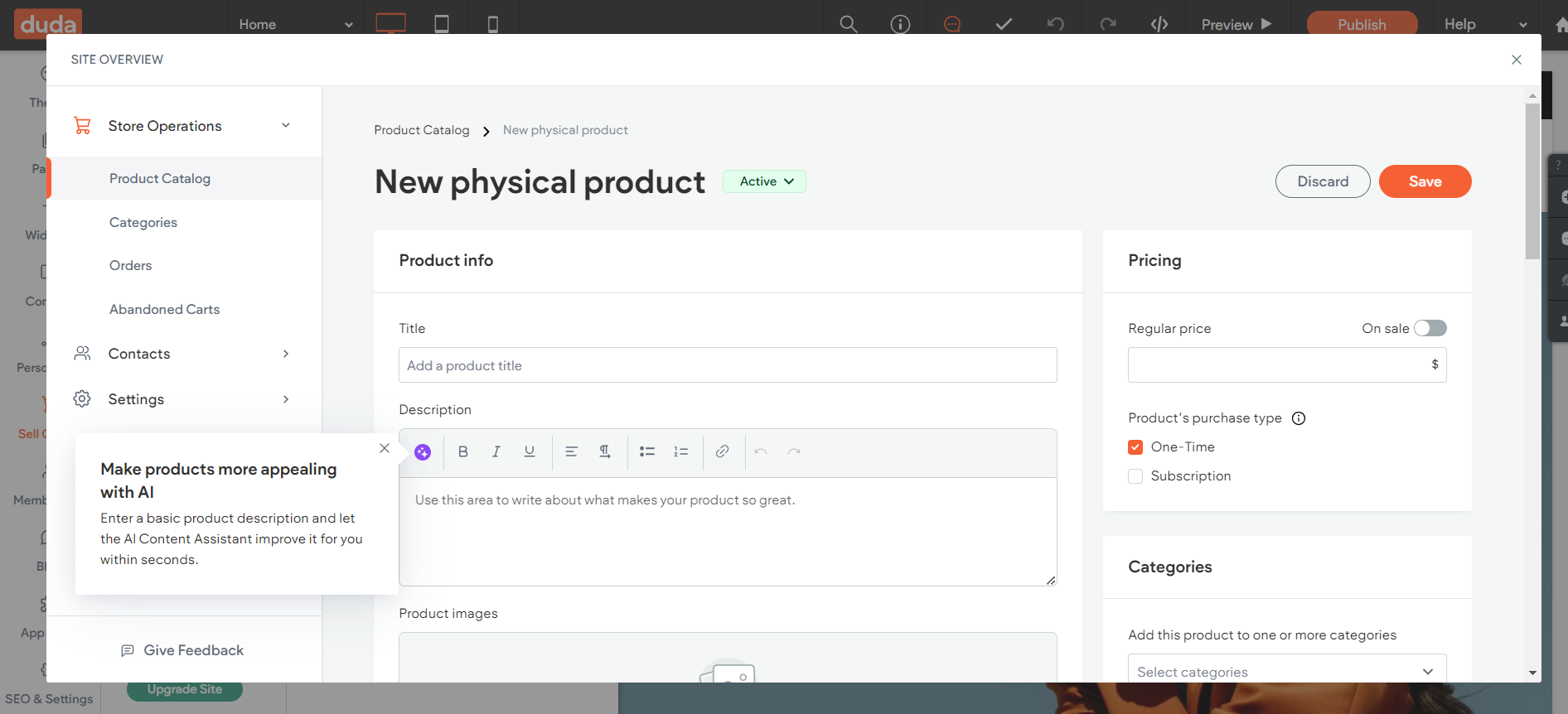
SubHub ecommerce features:
- Paypal and Stripe integration
- Physical and Digital product listings
- Pay-per view products
Ecommerce themes & templates
In terms of ecommerce themes and templates, Duda offers a small variety of ecommerce templates designed to help businesses create professional, responsive online stores. These templates are specifically tailored to support a wide range of ecommerce functionalities such as product catalogs, shopping carts, checkout processes, and payment gateways integration. SubHub, however, does not have ecommerce specific templates.
Product page customization
For product page customization, Duda allows users to easily add variations such as size and color directly from the product management section, defining attributes like small, medium, and large or red, blue, and green. Custom pricing and inventory management for each variation enable setting specific prices, promotional offers, SKU numbers, and inventory levels, facilitating detailed product version management. SubHub offers a range of product page customization options, allowing for the addition of physical items, digital downloads, and pay-per-view content.
Payment processing
When it comes to payment processing, Duda’s website builder integrates with Stripe and PayPal for payment processing, offering various methods like credit cards and AliPay. SubHub website builder supports two main payment gateways: Stripe and PayPal. These integrations allow for secure payment processing for subscriptions and store items using debit or credit cards. The platform itself does not charge commissions on transactions.
Website Editors
Website EditorsEvaluates the platforms’ website building and editing capabilities.Score Components:
- Customization tools (40%): Range and power of editing features.
- Editor usability (30%): User experience within the editor.
- Design flexibility (20%): Freedom in layout and design changes.
- Update and maintenance ease (10%): Simplicity of updating and maintaining the site.
 8.3
8.3
 6.9
6.9
🏆
Winner: Duda
. Duda, with a score of 8.3, offers a user-friendly platform designed for creating responsive websites with ease. It features a drag-and-drop interface, a wide range of customizable templates, and integrated SEO and marketing tools. The platform also offers ecommerce capabilities, collaborative tools for client management, and ensures websites are optimized for all devices. Hosting and security are taken care of by Duda, providing a comprehensive solution for building and managing professional websites efficiently.
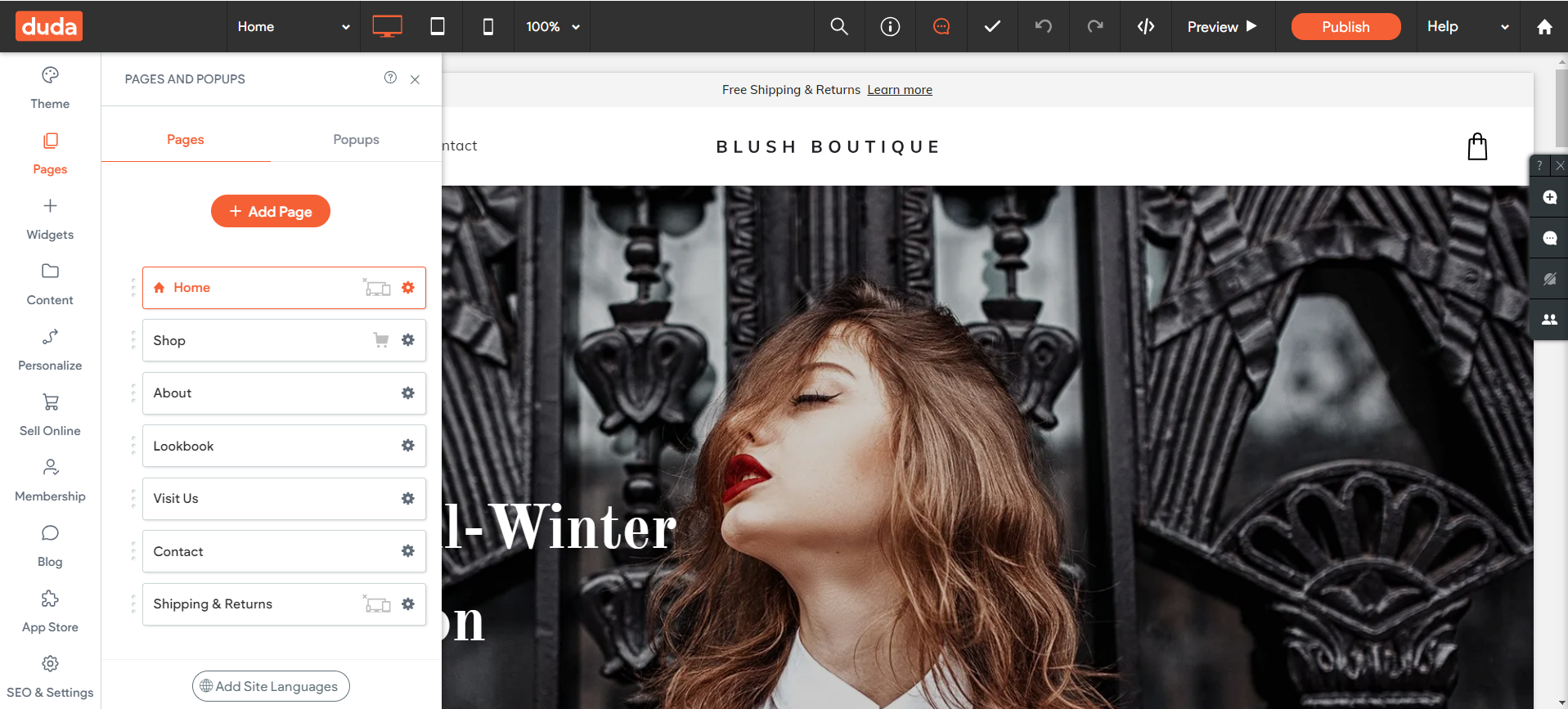
SubHub’s editor, scoring 6.9, is tailored for creating and managing membership sites, catering to content creators and entrepreneurs aiming to monetize their offerings. Its features encompass customizable templates, diverse content publishing options, and flexible subscription plans with seamless integration for recurring revenue through payment processors. Additionally, SubHub supports online course creation, provides marketing tools like landing page builders, and offers detailed analytics for monitoring website metrics.
Mobile editor/app
 5.5
5.5
 4.0
4.0

🏆
Winner: Duda
. Both Duda and SubHub do not have a dedicated mobile editor app. However, Duda offers some level of mobile editing through its platform, allowing users to perform limited editing and republish sites directly from mobile devices. On the other hand, SubHub allows users to manage some content on their website using the mobile browser version, but it’s not possible to change the layout and design of the website on mobile.
Based on the scores provided, Duda has a higher mobile editor score than SubHub, making it the winner in this category.
Product testing options
Product Testing OptionsAssesses the options for trying out platform features before commitment.Score Components:
- Trial quality (40%): Extent and usefulness of the trial or free version.
- Feature accessibility (30%): How many features are available to test.
- Trial duration (20%): Length of the trial period.
- Ease of transition (10%): Smoothness of moving from trial to paid plans.
 8.4
8.4
 7.0
7.0
Overall Result
:
Duda Wins
. Duda scores 8.4 in product testing options, while SubHub scores 7.0. Both Duda and SubHub offer a 14-day free trial, but Duda provides a longer money-back guarantee period of 30 days compared to SubHub’s 7 days. Both platforms allow testing of premium features during the free trial.

|

|
|
|---|---|---|
|
Free Plan |
No | No |
|
Trial Duration |
14 days | 14 days |
|
Testing Premium Features |
All features during free trial |
During the free trial |
|
Money Back Guarantee |
30 days |
7 days |
Price
PriceLooks at the cost-effectiveness and value for money of each platform.Score Components:
- Plan value (40%): What each pricing tier offers.
- Transparency and clarity (30%): Clearness of pricing structures.
- Flexibility of plans (20%): Range of options to suit different budgets.
- Hidden costs (10%): Additional expenses not included in the plan.
 7.9
7.9
 6.8
6.8
Duda offers a wider range of pricing options, including an enterprise plan, and a higher discount for annual subscriptions. SubHub, on the other hand, has a simpler pricing structure and is more affordable, but does not offer an enterprise plan.

|

|
|
|---|---|---|
|
$20-$30 |
Basic ($25/month): Includes hosting for one website with email support, 99.99% uptime, and access to Duda’s AI Content Assistant. Value for price: 6.0 |
No offering at this amount. |
|
$30-$50 |
Team ($39/month): Adds up to three team members, priority email, chat, and phone support, with team and client management features. Value for price: 7.0 |
Starter ($47/month): Up to 500 members, 5 GB storage, secure payment processing, course builder, 5 landing pages, e-commerce. Value for price: 6.5 |
|
$60-$100 |
Agency ($69/month): Offers hosting for up to four websites with priority support, account management, and access to advanced features. Value for price: 8.0 |
Pro ($97/month): Up to 2000 members, 50 GB storage, removes SubHub branding, 15 landing pages, along with Starter features. Value for price: 7.5 |
|
$100+ |
White Label ($199/month): For those needing to offer Duda under their own branding, including all Agency features plus white-label client access. Value for Price: 9.0 |
Premium ($147/month): Unlimited members, 200 GB storage, email white labelling, 30 landing pages, plus all Pro features. Value for Price: 8.5 |
location. As a result in rare cases the prices displayed here can differ from the ones you see on their
websites.
Hosting quality
Hosting
qualityExamines the reliability and performance of the hosting solutions.Score Components:
- Uptime (40%): Consistency and reliability of website availability.
- Speed (30%): Loading times and performance.
- Bandwidth and storage (20%): Sufficiency of resources provided.
- Data centers (10%): Quality and distribution of hosting infrastructure.
 8.8
8.8
 5.5
5.5
Winner: Duda
. Duda offers robust hosting solutions on Amazon Web Services (AWS) with high speed and no storage or bandwidth limitations. It also provides a 99.99% uptime guarantee. On the other hand, SubHub offers hosting with storage limitations and does not provide uptime statistics or guarantees. Duda’s superior hosting capabilities earn it a higher rating.

|

|
|
|---|---|---|
|
Do they offer hosting? |
Yes |
Yes |
|
Data Centers: |
AWS |
Not disclosed |
|
Type of hosting: |
AWS Cloud Hosting |
Managed Cloud Hosting |
|
Uptime: |
99.99% |
Not provided |
|
Uptime Guarantee: |
Yes, 99.99% |
No |
Website Speed Optimization
Website Speed OptimizationEvaluates optimization of website loading timesScore Components:
- PageSpeed Score (30%): Google’s score indicating performance optimization.
- Loading Time (30%): The average time until a website is fully interactive.
- Mobile Optimization (15%): Optimization effectiveness for mobile devices.
- Resource Optimization (15%): Optimizing images, scripts, and other heavy resources.
- CDN Usage (10%): Use of CDN to enhance speed across geolocations.
 7.6
7.6
 5.6
5.6
🏆 Winner: Duda
Both Duda and SubHub prioritize website performance and page speed, but Duda’s comprehensive approach to speed optimization gives it an edge over SubHub.

|

|
|
|---|---|---|
|
Focus |
Efficient Code and File Minification, CDN, Image Optimization, Mobile-Responsive Designs and AMP Support |
Image Optimization, Caching, Mobile Optimized design |
|
Performance Tools |
Google Lighthouse, PageSpeed Insights |
Google PageSpeed Insights |
|
Key Strategies |
Efficient Code and File Minification, CDN, Image Optimization, Mobile-Responsive Designs and AMP Support |
Image Optimization, Caching, Mobile Optimized design |
|
Load Times |
Varies widely, depending on the optimization and user’s location |
Varies depending on optimization and website complexity |
|
Page Speed Scores Range |
Varies widely, depending on the optimization and user’s location |
Varies depending on optimization and website complexity |
|
Core Web Vitals Improvement |
Emphasis on LCP, FID, CLS improvements |
No information provided |
Duda’s approach to enhancing site speed includes efficient code and file minification, use of a content distribution network (CDN), image optimization, and mobile-responsive designs. They also support Accelerated Mobile Pages (AMP) for faster mobile page loads. Duda places a strong emphasis on improving Core Web Vitals (CWV), focusing on Largest Contentful Paint (LCP), First Input Delay (FID), and Cumulative Layout Shift (CLS) improvements.
On the other hand, SubHub’s strategies for speed optimization include image optimization, caching, and mobile-optimized design. However, they do not provide any information on their Core Web Vitals improvements. The load times and PageSpeed scores for SubHub websites vary depending on optimization and website complexity.
Get a head start on website creation with AI
Create a custom website tailored to your business needs 10X faster with 10Web AI Website Builder!
Plugins and integrations
Plugins and integrationsMeasures the range and effectiveness of additional plugins and integrations.Score Components:
- Variety of options (40%): Range of available add-ons.
- Integration smoothness (30%): Ease of integrating plugins into the site.
- Quality of plugins (20%): Functionality and reliability of the options.
- Custom integration capabilities (10%): Support for custom or third-party integrations.
 7.7
7.7
 5.7
5.7
🏆 Winner: Duda.
With a score of 7.7, Duda offers a more extensive range of plugins and integrations compared to SubHub, which scores 5.7. Duda’s plugins enhance functionality across various domains, including ecommerce, social media integration, and SEO optimization. It also offers over 70 free widgets and connections to external services like marketing tools and payment gateways.
On the other hand, SubHub focuses on simplicity and integrated functionalities for building membership-based websites. It offers a set of built-in features and limited third-party integrations primarily with MailChimp, Google Analytics, and payment gateways like Stripe and PayPal.
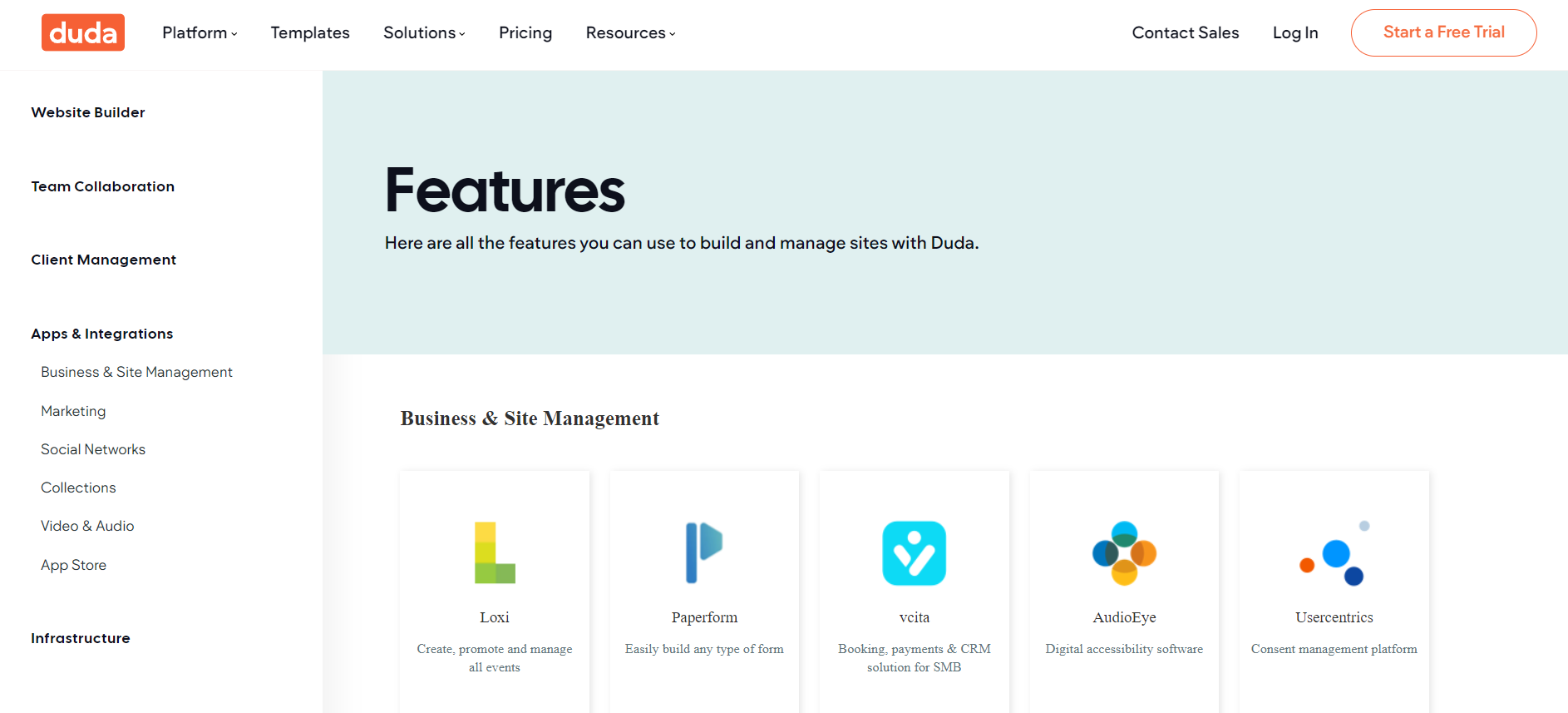
Marketing Features
Design FunctionalitiesRepresents how well each platform allows for creative design and customization of websites.Score Components:
- Template Variety (30%): Range and quality of design templates.
- Customization (30%): Flexibility and options for design alterations.
- User Interface (20%): Ease and intuitiveness of the design process.
- Responsiveness (10%): Adaptability to different devices and screen sizes.
- Innovation (10%): Unique design features and tools.
 7.1
7.1
 5.7
5.7
🏆
Overall Winner: Duda
. Duda stands out for its comprehensive SEO tools, integration with third-party email marketing platforms, and support for Google Analytics. SubHub, while offering similar features, lacks social media integration and has a lower overall score.

|

|
|
|---|---|---|
|
SEO Tools |
|
|
|
Email Marketing |
Through integration of third party platforms such as Mailchimp |
Yes, both built in and through integration of Mailchimp |
|
Blogging |
|
|
|
Social Media Integration |
|
|
|
Analytics and Reporting |
Supports Google Analytics for comprehensive web traffic and behavior analysis |
Yes |
|
Ads and Promotions |
Personalization tools for promotions, lacking direct marketing automation tools |
Yes |
Customer Support
Customer supportEvaluates the quality and availability of support options.Score Components:
- Response time (40%): Speed of support responses.
- Support quality (30%): Effectiveness and helpfulness of the support.
- Availability (20%): Range of support channels (phone, chat, email).
- Resource richness (10%): Quality of self-help and educational materials.
 7.5
7.5
 6.3
6.3
🏆 Winner: Duda
. In the Duda vs SubHub comparison, Duda takes the lead with a customer support score of 7.5. Duda offers extensive support options, including 24/5 email and live chat support for higher-tier plans, and additional support for enterprise customers, such as dedicated account management and business growth tools. This makes Duda a reliable choice for users needing consistent and comprehensive support.
SubHub, with a customer support score of 6.3, provides support primarily through email and a support portal. While it offers an FAQ section for quick answers, it lacks the extensive support hours and enterprise-level support that Duda provides. This makes SubHub more suitable for users with basic support needs and those who can rely on self-service resources.
Security
SecurityLooks at the platforms’ security measures and data protection.Score Components:
- Data protection (40%): Safeguards for user and customer data.
- SSL and encryption (30%): Implementation of secure connections.
- Compliance (20%): Adherence to industry security standards.
- Regular updates (10%): Frequency of security updates and patches.
 8.6
8.6
 4.0
4.0
🏆
Winner: Duda
. Duda takes a comprehensive approach to security, providing automatic SSL certificates for encryption, a Web Application Firewall (WAF) for filtering and monitoring HTTP traffic, DDoS protection, regular updates and patches, secure hosting, two-factor authentication (2FA), access controls, backup and recovery options, and monitoring with alerts.
SubHub, on the other hand, does not disclose any information about the security measures it provides, which is a significant drawback. Therefore, Duda is the clear winner in this comparison.
AI Capabilities
AI capabilitiesMeasures the effectiveness of AI-driven features and tools.Score Components:
- Automation efficiency (40%): Impact of AI on streamlining processes.
- Personalization (30%): AI-driven customization for users or customers.
- AI-Assisted design (20%): Role of AI in website design and functionality.
- Data analysis (10%): Use of AI in interpreting user data and analytics.
 7.3
7.3
 0
0

|

|
|
|---|---|---|
|
AI Builder |
Duda does not have AI website builder |
SubHub does not have an AI builder |
|
AI Ecommerce features |
AI Assistant for product and category descriptions, automated marketing emails |
SubHub does not have AI ecommerce features |
|
AI content generation |
Content generation for web pages, SEO optimization, grammar and spelling checks, editing, translating existing content, generating meta tags |
SubHub does not have AI content generation features |
|
Additional AI features |
AI Content Assistant, AI SEO Assistant, AI-generated alt text for images, AI-generated sections (in beta) |
SubHub does not have any AI features |
🏆 Winner: Duda
. Duda, with a score of 7.3, offers a suite of AI-powered features designed to streamline website building and optimization. These include an AI Content Assistant for efficient content generation, an AI SEO Assistant for automating meta titles and descriptions across site pages, and AI-generated alt text for images to enhance accessibility and SEO.
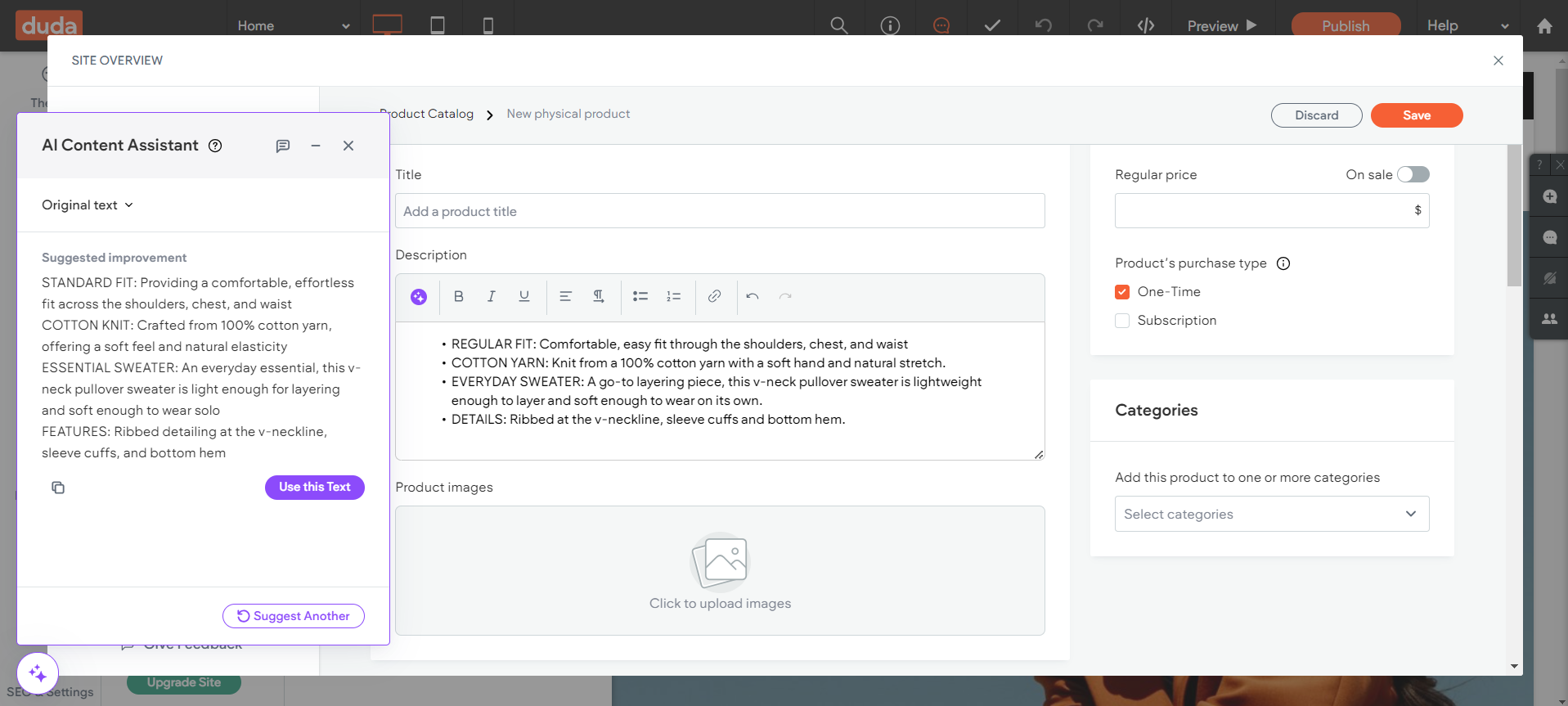
SubHub, on the other hand, does not have any AI capabilities.
User Management
User ManagementAssesses the platforms’ capabilities in managing user roles, permissions, and accessibility.Score Components:
- Role Customization (40%): Flexibility in creating and defining user roles and
permissions. - Ease of Management (30%): User interface and tools for managing users.
- Access Control (20%): Effectiveness of access control measures for different user
levels. - Scalability (10%): Ability to manage a growing number of users efficiently.
 8.0
8.0
 5.2
5.2
🏆 Winner: Duda
. Duda and SubHub both offer user management capabilities, but Duda provides more flexibility and control over user roles and permissions.
- Duda allows for collaborative website management, with the number of users and permissions varying by subscription plan. Higher-tier plans enable more users to participate, offering roles like Owner/Administrator, Designer, Content Editor, and Developer, each with distinct access levels. Some plans also allow for the creation of custom roles, providing flexibility in team management.
- SubHub allows multiple user accounts, however the platform does not specify how many accounts are supported.
SubHub User Roles and Access Levels:
| Role | Description | Access Highlights |
|---|---|---|
| Administrator | Full access to the platform except for Homepage and Course Editor. | Can manage all aspects of the platform, including content, store, and member management. |
| Content Management | Focuses on managing and organizing content within the platform. | Can access and manage content-related features but does not have access to Homepage or Course Editor. |
| Store (access only) | Specializes in handling the platform’s store features. | Limited to store management functions; no access to Homepage, Course Editor, or member management. |
| Member Manager (access only) | Oversees member accounts, roles, and subscriptions. | Can manage members and their subscriptions but cannot access Homepage, Course Editor, or store management. |
| Origin Admin Email | The initial administrator with the highest level of access, including Homepage and Course Editor. | Exclusive access to Homepage and Course Editor, on top of what the Administrator role provides. |
Additional Features

|

|
|
|---|---|---|
|
SSL Certificate |
|
|
|
Custom Domain |
|
|
|
Free Custom Domain Included |
|
|
|
International Domains |
|
|
|
Mobile Responsive |
|
|
|
Page Speed |
|
|
|
Website Builder Mobile App |
|
|
|
Convert a Website To An App |
|
|
|
Website Analytics |
|
|
|
Multilingual Sites |
|
|
|
Multiple Users |
|
|
Duda vs SubHub: User Feedback
Duda garners positive reviews for its user-friendly interface, extensive customization options, and responsive customer support. Users appreciate its drag-and-drop features, diverse integrations, and ability to cater to both novices and experienced developers. However, some note complexities with certain features like Duda Flex and occasional inconsistencies in design. Despite this, Duda remains a valuable tool for quick and efficient website development and management, offering a balance of ease-of-use and customization.
User feedback on SubHub presents a mix of positive and negative experiences, emphasizing the platform’s feature-rich environment and customizable templates. Users appreciate the flexibility and the quality of customer service, highlighting the platform’s continual updates and support as key benefits. However, some users express dissatisfaction with aspects such as the platform’s interface, lack of community features, and service fees for ticket resale. Concerns were also raised about the custom design service and mobile-friendly solutions taking longer than expected.
The making of this blog
We followed a clear, step-by-step process to write and research this article.
Duda vs SubHub: FAQ
What are the main differences between Duda and SubHub?
Which platform is better for ecommerce, Duda or SubHub?
Can I build an informational or business website with SubHub?
How do Duda and SubHub compare in terms of user management?
Which platform offers better customer support, Duda or SubHub?
Are there any AI capabilities in Duda or SubHub?










